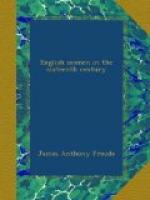had a worse enemy to deal with than Puritan controversialists
or spoilt Court favourites. The Protestant English
mariners stood between them and their prey, and had
to be encountered on an element which did not bow to
popes or princes, before Mary Stuart was to wear Elizabeth’s
crown or Cardinal Allen be enthroned at Canterbury.
It was a revelation to all parties. Elizabeth
herself had not expected—perhaps had not
wished—so signal a success. War was
now looked on as inevitable. The Spanish admirals
represented that the national honour required revenge
for an injury so open and so insolent. The Pope,
who had been long goading the lethargic Philip into
action, believed that now at last he would be compelled
to move; and even Philip himself, enduring as he was,
had been roused to perceive that intrigues and conspiracies
would serve his turn no longer. He must put out
his strength in earnest, or his own Spaniards might
turn upon him as unworthy of the crown of Isabella.
Very reluctantly he allowed the truth to be brought
home to him. He had never liked the thought of
invading England. If he conquered it, he would
not be allowed to keep it. Mary Stuart would
have to be made queen, and Mary Stuart was part French,
and might be wholly French. The burden of the
work would be thrown entirely on his shoulders, and
his own reward was to be the Church’s blessing
and the approval of his own conscience—nothing
else, so far as he could see. The Pope would recover
his annates, his Peter’s pence, and his indulgence
market.
If the thing was to be done, the Pope, it was clear,
ought to pay part of the cost, and this was what the
Pope did not intend to do if he could help it.
The Pope was flattering himself that Drake’s
performance would compel Spain to go to war with England
whether he assisted or did not. In this matter
Philip attempted to undeceive his Holiness. He
instructed Olivarez, his ambassador at Rome, to tell
the Pope that nothing had been yet done to him by
the English which he could not overlook, and unless
the Pope would come down with a handsome contribution
peace he would make. The Pope stormed and raged;
he said he doubted whether Philip was a true son of
the Church at all; he flung plates and dishes at the
servants’ heads at dinner. He said that
if he gave Philip money Philip would put it in his
pocket and laugh at him. Not one maravedi would
he give till a Spanish army was actually landed on
English shores, and from this resolution he was not
to be moved.
To Philip it was painfully certain that if he invaded
and conquered England the English Catholics would
insist that he must make Mary Stuart queen. He
did not like Mary Stuart. He disapproved of her
character. He distrusted her promises. Spite
of Jesuits and seminary priests, he believed that
she was still a Frenchwoman at heart, and a bad woman
besides. Yet something he must do for the outraged
honour of Castile. He concluded, in his slow
way, that he would collect a fleet, the largest and




